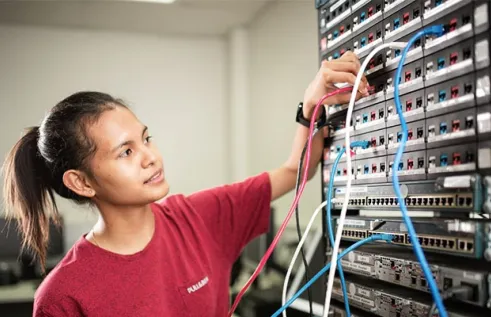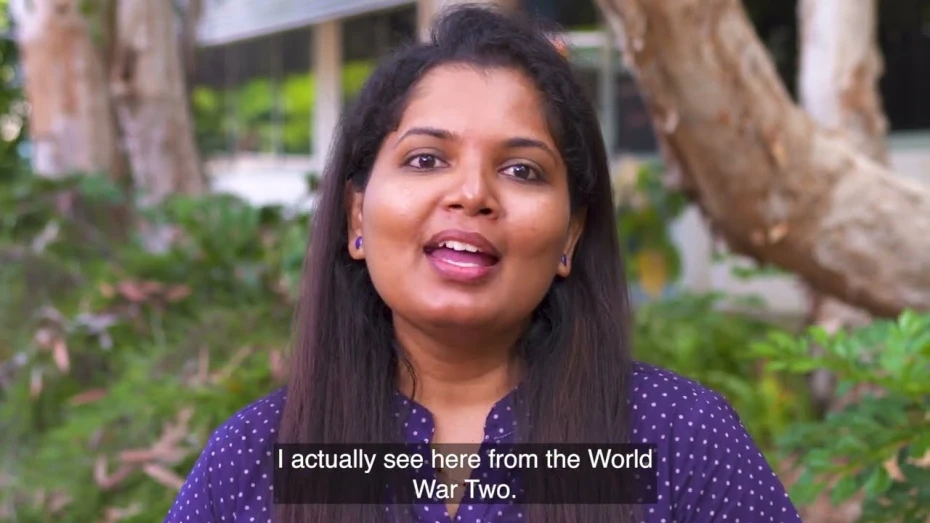Key details
Duration
Intake
Locations
Entry requirements
View full entry requirementsCredit points required
320Course code
Overview
The Bachelor of Software Engineering Honours will allow you to develop your understanding of the underlying principles and applications of software engineering. Additionally, you will gain professional knowledge and skills that will allow you to stand out from the crowd in the digital world.
Study opportunities are also provided to assist students to undertake sought-after industry modules, including Cisco and Microsoft certification.
Career opportunities
Your broad skill set prepares you to move into both small and large organisations, consultancy, startups, government and private companies.
Professional recognition
The Bachelor of Software Engineering Honours is accredited by Australian Computer Society at the level of professional practice in ICT, and is therefore recognised internationally under the Seoul Accord.
Fees
Commonwealth supported places
Commonwealth Supported places are available in this course to students who meet one of the following residency requirements:
(a) be an Australian citizen, who will complete some of your course of study while resident in Australia; or
(b) a New Zealand citizen; or an Australian permanent visa holder; or an eligible former permanent humanitarian visa holder; who studies the entire course while living in Australia.
Further information about fees and charges can be found at Fees and Payments.
International tuition fees
The annual tuition fee for full time study in 2026 is AUD $39,392.00. This equates to $4,924.00 per 10 credit point unit (0.125 EFTSL).
These fees are subject to increases annually, effective at the start of each calendar year.
You can find a list of International fees and payments you can expect to pay as part of your studies in Australia. See 2026 Higher Education International Annual Tuition Fees.
CDU offers a number of scholarships to international students to assist with the cost of study.

Why study IT and network engineering at CDU?
From dealing with cyber crime to software engineering and data collection, an IT degree at CDU is tailored to industry demand. You'll graduate equipped with the technical and analytical skills to future-proof your career across multiple sectors.
- #2 in Australia for undergraduate learner engagement in computing and IT (GUG 2024)
- Use state-of-the-art technologies and methodologies
- Choose to study online, on campus, part-time or full-time as it suits you

Why study IT and Network Engineering at CDU?
From dealing with cyber crime to software engineering and data collection, an IT degree at CDU is tailored to industry demand. You'll graduate equipped with the technical and analytical skills to future-proof your career across multiple sectors.
- #2 in Australia for undergraduate learner engagement in computing and IT (GUG 2024)
- Use state-of-the-art technologies and methodologies

Why study IT and network engineering at CDU?
From dealing with cyber crime to software engineering and data collection, an IT degree at CDU is tailored to industry demand. You'll graduate equipped with the technical and analytical skills to future-proof your career across multiple sectors.
- #2 in Australia for undergraduate learner engagement in computing and IT (GUG 2024)
- Use state-of-the-art technologies and methodologies
- Choose to study online, on campus, part-time or full-time as it suits you

Why study IT and Network Engineering at CDU?
From dealing with cyber crime to software engineering and data collection, an IT degree at CDU is tailored to industry demand. You'll graduate equipped with the technical and analytical skills to future-proof your career across multiple sectors.
- #2 in Australia for undergraduate learner engagement in computing and IT (GUG 2024)
- Use state-of-the-art technologies and methodologies
What will I study?
The core of this program prepares students with the necessary software engineering skills so that they are well prepared for work when graduated.
Course structure
The program stresses both the importance of theory and the application of theory into practice through projects and practical exercises.
A candidate must successfully complete units totalling 320 credit points as detailed below. All units are valued at 10 credit points unless indicated.
A candidate must successfully complete units totalling 320 credit points (cp) as detailed below. All units are valued at 10 credit points unless otherwise indicated.
| Unit type | Credit Points | Specific requirements |
| Common Units (2 units) | 20cp | Compulsory Core unit totalling 10 credit points as detailed below: IAS201 Cultural Capabilities (compulsory) Plus either: CUC106 Design and Innovation: Communicating Technology |
| Core Units (24 units) | 250cp | Compulsory Core unit totalling 250 credit points as detailed below: HIT137 Software Now HIT140 Foundations of Data Science HIT164 Computing Fundamentals HIT172 Operating Systems and Applications HIT234 Database Concepts HIT220 Algorithms and Complexity HIT226 Mobile Web Structures ENG229 Digital Systems and Computer Architecture (replaces HIT235 from 2026) HIT237 Building Interactive Software HIT238 The Mobile Paradigm HIT274 Network Engineering Applications PMO201 Project Management HIT333 Cyber Security HIT372 Organisation Network Infrastructure HIT374 Enterprise Network Engineering HIT326 Database-driven Web Applications ENG365 C Programming (replaces HIT365 from 2026) HIT339 Distributed Development HIT381 Human Computer Interaction Design PRT565 Machine Learning, Artificial Intelligence and Algorithms (replaces PRT580 from 2026) PRT581 Principles of Software Systems PRT582 Software Engineering: Process and Tools PRT583 Process Development Methodologies PRT585 Software Engineering Practice (20cp) (replaces PRT681) |
| Research Units (2 units) | 40cp | Research units totalling 40 credit points selected from the units listed below: ENG721 Honours Thesis Part A (20cp) ENG722 Honours Thesis Part B (20cp) (ENG721 and ENG722 replaces ENG720 Honours Thesis (20cp, repeatable) x 2 from 2025) |
| Elective Units (1 unit) | 10cp | Specialist Elective unit totalling 10 credit points selected from undergraduate units offered by the University. |
| 320cp | Total Credit Points |
Course Rules (unless otherwise indicated in the above course structure)
- See the Higher Education Course Rules (Award Requirements) in the Units and Courses Policy.
COURSE CHANGES AND TRANSITIONAL ARRANGEMENTS - 2026
From 2026, the course structure has changed as follows:
Core units:
- ENG229 Digital Systems and Computer Architecture replaces HIT235 Digital Systems and Computer Architecture (equivalent units).
- ENG365 C Programming replaces HIT365 C Programming (equivalent units)
- PRT565 Machine Learning, Artificial Intelligence and Algorithms replaces PRT580 Discrete Structures (equivalent units).
- PRT585 Software Engineering Practice (20cp) replaces PRT681 Software Engineering Practice (20cp).
Transitional Arrangements
- Students who have completed HIT235 Digital Systems and Computer Architecture prior to 2026 do not have to complete ENG229.
- Students who have completed HIT365 C Programming prior to 2026 do not have to complete ENG365.
- Students who have completed PRT580 Discrete Structures prior to 2026 do not have to complete PRT565.
- Students who have completed PRT681 Software Engineering Practice prior to 2026 do not have to complete PRT585.
COURSE CHANGES AND TRANSITIONAL ARRANGEMENTS - 2025
Course Changes
From 2025, the course structure has changed as follows:
- ENG720 Honours Thesis has been discontinued and replaced by equivalent units ENG721 Honours Thesis Part A and ENG722 Honours Thesis Part B
Transitional Arrangements
- Students who have completed ENG720 Honours Thesis (Part A) should NOT complete ENG721 Honours Thesis Part A
- Students who have NOT completed ENG720 Honours Thesis should complete ENG721 Honours Thesis Part A and ENG722 Honours Thesis Part B
Any student who believes they may be disadvantaged by these changes should contact the course coordinator for any assistance.
Study plan
STUDENTS COMMENCING IN SEMESTER 1
The Recommended Study Plans provided below are suitable for students enrolling in a full-time study load. Students entering this course with advanced standing, or wishing to vary their study plan due to work, personal, financial or other reasons should use the table as a guide to create an individual study plan.
When designing an individual study plan:
- maintain the basic order in which units are to be attempted; and
- check the prerequisite and assumed knowledge for each unit as some units assume you have completed foundation unit/s in the unit area at a lower level.
| Legend: | CU = Common Unit | CO = Core Unit | R = Research | E = General Elective |
Full-Time Study Plan
| Semester 1 | Semester 2 | ||
| Year 1 | |||
| IAS201 Cultural Capabilities | CU | CUC106 Design and Innovation: Communicating Technology OR LAL100 Language, Literacy and Sustainability | CU |
| HIT164 Computing Fundamentals | CO | HIT137 Software Now | CO |
| HIT172 Operating Systems and Applications | CO | HIT140 Foundations of Data Science | CO |
| Elective | E | PMO201 Project Management | CO |
| Year 2 | |||
| HIT226 Mobile Web Structures | CO | HIT220 Algorithms and Complexity | CO |
| ENG229 Digital Systems and Computer Architecture (replaces HIT235 from 2026) | CO | HIT238 The Mobile Paradigm | CO |
| HIT237 Building Interactive Software | CO | HIT274 Network Engineering Applications | CO |
| HIT234 Database Concepts | CO | HIT372 Organisation Network Infrastructure | CO |
| Year 3 | |||
| HIT374 Enterprise Network Engineering | CO | HIT339 Distributed Development | CO |
| HIT381 Human Computer Interaction Design | CO | PRT582 Software Engineering: Process and Tools | CO |
| HIT326 Database-Driven Web Applications | CO | HIT333 Cyber Security | CO |
| PRT581 Principles of Software Systems | CO | PRT565 Machine Learning, Artificial Intelligence and Algorithms (replaces PRT580 from 2026) | CO |
| Year 4 | |||
| ENG721 Honours Thesis Part A (20cp) | R | ENG722 Honours Thesis Part B (20cp) | R |
| PRT583 Process Development Methodologies | CO | PRT585 Software Engineering Practice (20cp) (replaces PRT681) | CO |
| ENG365 C Programming (replaces HIT365 from 2026) | CO | ||
_____________________________________
STUDENTS COMMENCING IN SEMESTER 2
The Recommended Study Plans provided below are suitable for students enrolling in a full-time study load. Students entering this course with advanced standing, or wishing to vary their study plan due to work, personal, financial or other reasons should use the table as a guide to create an individual study plan.
When designing an individual study plan:
- maintain the basic order in which units are to be attempted; and
- check the prerequisite and assumed knowledge for each unit as some units assume you have completed foundation unit/s in the unit area at a lower level.
| Legend: | CU = Common Unit | CO = Core Unit | R = Research | E = General Elective |
Full-Time Study Plan
| Semester 1 | Semester 2 | ||
| Year 1 | |||
| CUC106 Design and Innovation: Communicating Technology OR LAL100 Language, Literacy and Sustainability | CU | ||
| HIT137 Software Now | CO | ||
| HIT140 Foundations of Data Science | CO | ||
| PMO201 Project Management | CO | ||
| Year 2 | |||
| IAS201 Cultural Capabilities | CU | HIT220 Algorithms and Complexity | CO |
| HIT164 Computing Fundamentals | CO | HIT339 Distributed Development | CO |
| HIT172 Operating Systems and Applications | CO | HIT274 Network Engineering Applications | CO |
| HIT237 Building Interactive Software | CO | HIT372 Organisation Network Infrastructure | CO |
| Year 3 | |||
| HIT234 Database Concepts | CO | HIT238 The Mobile Paradigm | CO |
| ENG229 Digital Systems and Computer Architecture (replaces HIT235 from 2026) | CO | HIT333 Cyber Security | CO |
| HIT226Mobile Web Structures | CO | PRT582 Software Engineering: Process and Tools | CO |
| Elective | E | PRT565 Machine Learning, Artificial Intelligence and Algorithms (replaces PRT580 from 2026) | CO |
| Year 4 | |||
| HIT374 Enterprise Network Engineering | CO | ENG721 Honours Thesis Part A (20cp) | R |
| HIT381 Human Computer Interaction Design | CO | PRT585 Software Engineering Practice (20cp) (replaces PRT681) | CO |
| HIT326 Database-Driven Web Applications | CO | ||
| PRT581 Principles of Software Systems | CO | ||
| Year 5 | |||
| ENG722 Honours Thesis Part B (20cp) | R | ||
| PRT583 Process Development Methodologies | CO | ||
| ENG365 C Programming (replaces HIT365 from 2026) | CO | ||
____________________________________________
STUDENTS COMMENCING IN SUMMER SEMESTER
The Recommended Study Plans provided below are suitable for students enrolling in a full-time study load. Students entering this course with advanced standing, or wishing to vary their study plan due to work, personal, financial or other reasons should use the table as a guide to create an individual study plan.
When designing an individual study plan:
- maintain the basic order in which units are to be attempted; and
- check the prerequisite and assumed knowledge for each unit as some units assume you have completed foundation unit/s in the unit area at a lower level.
| Legend: | CU = Common Unit | CO = Core Unit | R = Research | E = General Elective |
Full-Time Study Plan
| Semester 1 | Semester 2 | Summer Semester | |||
| Year 1 | |||||
| CUC106 Design and Innovation: Communicating Technology | CU | ||||
| HIT137 Software Now | CO | ||||
| Year 2 | |||||
| HIT164 Computing Fundamentals | CO | IAS201 Cultural Capabilities | CU | ||
| HIT172 Operating Systems and Applications | CO | HIT140 Foundations of Data Science | CO | ||
| Elective | E | PMO201 Project Management | CO | ||
| Year 3 | |||||
| HIT226 Mobile Web Structures | CO | HIT220 Algorithms and Complexity | CO
| ||
| ENG229 Digital Systems and Computer Architecture (replaces HIT235 from 2026) | CO | HIT238 The Mobile Paradigm | CO | ||
| HIT237 Building Interactive Software | CO | HIT274 Network Engineering Applications | CO | ||
| HIT234 Database Concepts | CO | HIT372 Organisation Network Infrastructure | CO | ||
| Year 4 | |||||
| HIT374 Enterprise Network Engineering | CO | HIT339 Distributed Development | CO | ||
| HIT381 Human Computer Interaction Design | CO | PRT582 Software Engineering: Process and Tools | CO | ||
| HIT326 Database-Driven Web Applications | CO | HIT333 Cyber Security | CO | ||
| PRT581 Principles of Software Systems | CO | PRT565 Machine Learning, Artificial Intelligence and Algorithms (replaces PRT580 from 2026) | CO | ||
| Year 5 | |||||
| ENG721 Honours Thesis Part A (20cp) | R | ENG722 Honours Thesis Part B (20cp) | R | ||
| PRT583 Process Development Methodologies | CO | PRT585 Software Engineering Practice (20cp) (replaces PRT681) | CO | ||
| ENG365 C Programming (replaces HIT365 from 2026) | CO | ||||
Entry requirements
Admission criteria
Admission requirements are met by one of the following:
- Successful completion of the Northern Territory Certificate of Education and Training (or equivalent) and the awarding of an Australian Tertiary Admissions Rank (ATAR) of at least 70*.
- Successful completion of a national qualification at Certificate IV level or higher.
- Successful completion of at least 0.5 year of full-time study (or equivalent) of a higher education degree/diploma.
- Overseas secondary or tertiary qualifications considered equivalent to the above Australian qualifications.
- Attainment of a STAT Multiple Choice score of 147.
- Successful completion of the Tertiary Enabling Program, the Preparation for Tertiary Success courses, or other recognised tertiary preparation course of at least 12 months duration.
- Submission of an acceptable personal competencies statement and/or employment experience.
* After any applicable adjustment factors have been applied.
International entry pathway
International applicants who have completed the CDU Foundation Studies Program; and achieved a minimum mark of 65% in Foundation English A and B; and successfully complete FSP010 Mathematics with Calculus; are eligible to apply.
Essential requirements
English language requirements
DOMESTIC STUDENTS
To gain entry into Charles Darwin University, all Higher Education applicants must satisfy the University's English Language Proficiency Requirements for their chosen course of study. All applicants will be required to supply evidence of this at the time of application.
The minimum English language requirement for this course can be met by evidencing of one of the following:
| Year 12 | Successful completion of Year 12 within Australia, or an equivalent qualification from an approved country where English is the official language (refer to our approved standard and extended lists included below). |
| 0.5 FTE Higher Education Study | Successful completion of at least 0.5FTE of higher education study from Australia or an approved country where English is the official language (refer to our approved standard and extended lists included below). If studies were completed from a country on the extended list, they must have been completed within the past five (5) years. |
| CDU Enabling Course | Successful completion of a Charles Darwin University enabling program of at least 0.5FTE (40 credit points). |
| TAFE Qualification | Successful completion of a recognised TAFE qualification at a Certificate III level or higher from Australia. |
| AHPRA Registration | Current AHPRA registration as a Division 1 or Division 2 nurse. Registration must be current at the time of course commencement. |
| English Test^ | Completion of an approved English test within two years of commencement, meeting the minimum scores outlined in the table below. |
^ Minimum Requirements for English Tests:
| Postgraduate requirements | Undergraduate requirements | |
| CDU ELICOS - English for Academic Purposes | Successful completion of EAP004 | Successful completion of EAP003 |
| International English Language Testing System (IELTS) Academic test | Overall minimum: 6.5 No band below: 6.0 | Overall minimum: 6.0 No band below 6.0 |
| Cambridge English: Advanced (CAE) | Overall minimum: 176 No skill below: 169 | Overall minimum: 169 No skill below 169 |
| Pearson Tests of English (PTE) Academic | Overall minimum: 58 No score below 50 | Overall minimum: 50 No score below: 50 |
| Test of English as a Foreign language | Overall minimum: 79 Minimum writing score: 21 | Overall minimum: 60 Minimum writing score: 21 |
IELTS One Skill Retake is accepted, allowing candidates to retake a single skill within 60 days of sitting their initial test. One Skill Retake results are valid for two years from the date of the first test (not from the date of the Retake test) to the date of commencement at CDU.
CDU accepts combined results from two test sittings of IELTS Academic, PTE Academic, or TOEFL, taken within a six-month period, if:
- Both tests were under the same testing system; and
- The overall score in both tests meets the overall minimum; and
- The applicant achieved the section minimum for each section in at least one test.
Recognised English-speaking countries:
| Standard List | Antigua and Barbuda, Australia, Barbados, British Virgin Islands, Canada, Ireland, New Zealand, Singapore, South Africa, United Kingdom, United States of America. |
| Extended List | Bermuda, Botswana, Cayman Islands, Ethiopia, Fiji, Kenya, Malawi, Malta, Mauritius, Seychelles, St Vincent and the Grenadines, Tanzania, Trinidad and Tobago, Vanuatu, Zimbabwe. |
For further details on the English requirements for CDU courses, please refer to the CDU English Language Proficiency Policy.
INTERNATIONAL STUDENTS
To gain entry into Charles Darwin University, all Higher Education applicants must satisfy the University's English Language Proficiency Requirements for their chosen course of study.
The minimum English language requirement for this course is met by either undertaking previous education from an English-speaking country or undertaking one of the following English language tests and obtaining the minimum requirements listed below.
| CDU English for Academic Purposes 3 (ZEAP30) | Successful completion of EAP003 English for Academic Purposes 3 |
| IELTS Academic Module (including One Skill Retake) | A minimum overall score of 6.0 with no band less than 6.0. |
| Cambridge Advanced English (CAE) | A minimum overall score of 169, with no skill below 169. |
| Common European Framework Certificate of English Proficiency | A minimum overall grade of B2. |
| Pearson Test of English (PTE) Academic module | A minimum overall score of 50 with no score lower than 50. |
| TOEFL Internet-based Test (iBT) | A minimum overall score of 60 and a minimum writing score of 21. |
* All tests are valid for two years from the date of the test to the date of commencement at CDU, unless otherwise specified.
* Where applicable, international applicants must also satisfy the Department of Home Affairs (DHA) English language requirements for student visa applications.
Do you have a question regarding English requirements at CDU? Please email: international@cdu.edu.au.
ATAR profile
The following table represents the ATAR and selection rank profile for applicants offered a place on the basis of their ATAR in semester 1, 2025
| ATAR based offers only | ATAR (excluding adjustment factors) | Selection Rank (ATAR plus any adjustment factors) |
|---|---|---|
| Lowest rank to receive an offer | <5 | <5 |
| Median rank to receive an offer | <5 | <5 |
| Highest rank to receive an offer | <5 | <5 |
Notes
"<5" indicates less than 5 ATAR-based offers were made.
Assumed knowledge
Stage 2 Mathematical Methods or equivalent.
CDU is a growing university and encourages people to grow as well. There are a lot of options and flexibility when it comes to study and the staff have always been helpful and supportive in making my dreams come true.
Sami

I have decided to stay in Darwin because I found an amazing job here. I wouldn’t be exposed to this variety of roles and experience anywhere else in Australia.
Srijana
CDU student

CDU is a growing university and encourages people to grow as well. There are a lot of options and flexibility when it comes to study and the staff have always been helpful and supportive in making my dreams come true.
Sami

I have decided to stay in Darwin because I found an amazing job here. I wouldn’t be exposed to this variety of roles and experience anywhere else in Australia.
Srijana
CDU student

Course details
Inherent Requirements
There are inherent requirements for this course. Students must read and understand the requirements for this course.
Australian qualification framework
This course is recognised in the Australian Qualifications Framework at Level 8.
Student profile
There are no statistics available for this course. It may be that the course is new or the profile data is unavailable.
Additional information
Contact details
For further information about the course, enrolment procedures, closing dates and other administrative issues please contact Student Central on:
You make CDU
Together we are a positive force for change in our communities and the world.
Learn about information technology at CDU
Kalyani is from India studying a Master of Information Technology (Information Systems and Data Science) at CDU. Hear more about her experience of studying, living, working and playing in Darwin, Northern Territory, Australia.
You make CDU
Together we are a positive force for change in our communities and the world.
Learn about information technology at CDU
Kalyani is from India studying a Master of Information Technology (Information Systems and Data Science) at CDU. Hear more about her experience of studying, living, working and playing in Darwin, Northern Territory, Australia.
How to apply
There are many ways to apply to CDU. The method you use depends on your course type, where you live and whether you are a new or returning student to CDU.
Remember to apply early for your best chance at securing an offer to study with us.
SATAC
SATAC is the application channel for residents of NT, ACT, SA, WA, QLD, VIC, NSW or TAS.
MyNextCourse
Direct applications are available to students who have completed a CDU or BIITE course at a Certificate III level or higher. Most CDU and BIITE enabling programs are also accepted through this process.
International applications
Applications must be submitted online through our application portal, Studylink. You'll need a valid email address to create your online account. Once you have started your application, you will be able to save it and resume it later. There is no application fee when you apply online.
You may be able to lodge a direct application; however, there may be restrictions on your geographic location. If you cannot submit a direct application via the application portal, please apply through one of our registered agents.
If you do not meet any of the criteria above please visit Pathways to study to view the options available to you.



Share this course